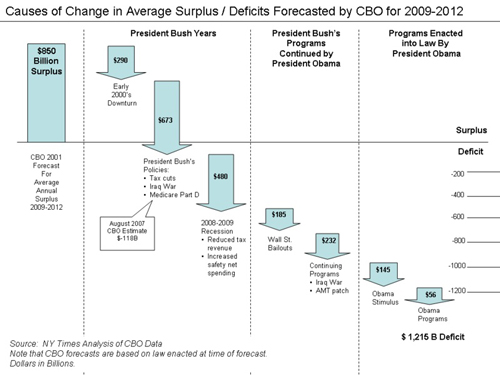
Click on the image to open it larger in a new page. It presents a clear history where the famous deficit orginated.
At the end of the Clinton presidency, the federal government wasn't running a deficit: it had a surplus! However Bush II fixed that quick. First there were the tax cuts (mostly on the wealthy) so the government brought in less money. Then there was the economic downturn after 9/11 and tax receipts fell some more. Then we went to war twice (!) without making any provision to pay for it. Wouldn't want people to think that wars cost money, would you?
Finally, Republicans rammed through Congress the Medicare Part D drug benefit, a jerry-rigged edifice that prevents the feds from bargaining down drug prices, leaves some elders in the lurch by not paying for prescriptions that fall into a "donut-hole," and which never had any plan for the government to cover costs except by deficit spending. Not exactly good fiscal management, any of that.
Then Wall Street financial shenanigans brought the banking system to the verge of collapse in 2008 and the government had to bail them out. Or at least so everyone in charge was convinced. That cost billions. And along came the Great Recession (which we're only coming out of if you believe the evidence of statisticians rather than your own experience and your neighbor's) so tax receipts fell. President Obama and the ruling Democrats pushed through the stimulus and are now working on a "jobs stimulus" and that cost some more on top of the Bush legacy.
And that is the source of the deficit. How do we pay it off? Historically, the U.S. has been about to pay its debts because our economy grew, we accumulated new wealth, and remained a safe borrower. Unless the economy has permanently lost its dynamism, that's what will happen again.
Trying to fix the deficit when the economy needs to be put back on its feet is simply insane. What we need now is to get going again, not to cut off the federal pump. That's the only way to pay off the long term debt.
(Since we're in national budget season, I'm not going to to resist offering occasional short comments on budget matters and process under this headline, just as I have done about health care reform. I have strong foundational views on what the U.S. government ought to be doing about and with taxpayers' money that I've laid out in this post.)
No comments:
Post a Comment